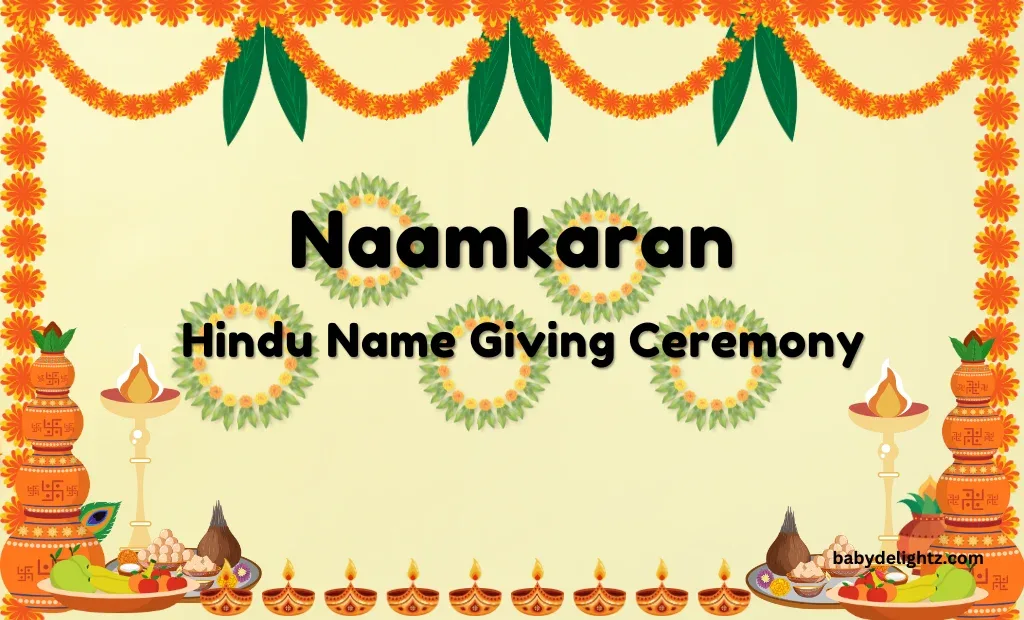Naamkaran is a Sanskrit word that literally means “name giving”. This Hindu baby naming ceremony is the fifth Samskara or rite of passage when the name of the baby is announced to the family. This ceremony is usually held on the 12th day after the birth of a child
Naamkaran ceremony for Hindus is a happy and very significant ritual where the family is gathered and a priest is consulted on the 12th day after the child’s birth.
For this Samskara the date and time of the child’s birth, the position of stars, and some other astrological aspects are taken into consideration to give the baby a beautiful and perfect name.
Like Sadhguru said,
“A sound is attached to a form, and a form is attached to a sound”
Significance of The Hindu Baby Naming Ceremony
The Hindu baby naming ceremony, known as Namakarana, is a significant ritual in Hinduism that marks the acceptance and socialization of a child by the people around them. The infant is bathed, dressed in new garments, and given a formal name, which is typically two or four syllables for boys and an odd number of syllables for girls, ending in a long ā or ī.
The rite of passage includes a gathering of friends and relatives of the baby’s parents, typically with gifts and a feast. The ancient Sanskrit texts provide guidelines for choosing names, with preferences for names affiliated with a deity, family’s geometry, virtues, good qualities, lucky stars, constellations, derivatives of the name of the father, mother, or the place of birth, or beautiful elements of nature. The name is chosen carefully as it is believed to greatly influence the child’s life, behavior, and deeds.
Key Reasons for the Significance of Names in Hindu Culture
In Hinduism, a name holds great significance because of so many reasons. We have mentioned some of them
Mantra
A person’s name for Hindus is considered a kind of mantra. A sound that, when you utter should generate a good response. Naamkaran is not just any ceremony that they hold, but a Samskara. Naming a baby is considered so important that a priest is consulted before making the final decision.
Luck
Astrology and Horology have a great influence on Hindu life, and these aspects are the foundation of the Naamkaran ceremony. It is believed that if the name is not according to the planetary position of the solar system on the day of the child’s birth, it can bring bad luck.
Sanskrit has 54 alphabets and these alphabets, if broken, give hundred different sounds. Keeping solar position in mind it is decided that a person born on this day and this time should be given this specific sound (name) to ensure continued luck.
Link Between Past, Present, and Future
This ceremony is also significant because of the Hindu belief in reincarnation and Karma. Karma is the sum of a person’s deeds in this life and his previous lives. According to the Vedas, Karma is directly linked to astrology. Hence it also has an impact on a person’s future existence. This proves that for Hindus name is not just a mere identity, but an obligatory religious practice and a direct link between the past, present, and future lives of a person. According to Hinduism the meaning of a name influences a person’s personality and character.
Naamkaran and Family Values
This Hindu baby naming ceremony is a religious practice and is not just blissful for the newborn but for the whole family. It strengthens familial bonds and reinforces cultural values. The involvement of family members in choosing a name fosters a sense of unity and shared responsibility toward the child’s well-being. This tradition also serves as a platform for passing down ancestral wisdom and teachings, preserving the rich tapestry of family heritage. Through Naamkaran, families celebrate not just the arrival of a new member but also their collective values, beliefs, and aspirations for the future.
If you are confused between too many name choices then click here and let us help you out.
People Also Ask
What are the 5 names in the Hindu baby naming ceremony?
In Hindu naming ceremonies, five names can be given to the newborn. These include the Rashi name based on the zodiac sign, the Nakshatra name from the birth star, the Masa name related to the month of birth, the Family Deity name, and the common worldly name used daily.
How do you plan a simple naming ceremony?
Planning a simple Naamkaran ceremony involves several steps. Start by choosing an auspicious date and time based on astrology or family traditions. Decide on the venue, whether it’s at home or a community hall. Create a guest list and send out invitations well in advance. Arrange for traditional decorations, such as flowers, rangoli, or banners with the baby’s name. Prepare for rituals like havan (sacred fire), prayers, and blessings by a priest or elder. Organize refreshments or a small meal for guests to enjoy after the ceremony. Lastly, ensure that the baby’s attire and accessories, like a traditional outfit or jewelry, are ready for the occasion.
What are the six items used for Hindu baby naming ceremony?
In a Hindu naming ceremony, six essential items play significant roles. The sacred fire (Havan Kund) symbolizes purity and is central to rituals like havan. Holy water (Panchamrit), a blend of milk, curd, honey, ghee, and sugar, bestows blessings. Sandalwood paste (Chandan) signifies auspiciousness when applied on the baby’s forehead. Kumkum, a red powder, is used for tilak or marks of blessings. Flowers (Pushpam) are offered in prayers, representing purity and devotion. Fruits (Phalam) symbolize abundance and prosperity, blessing the child’s future endeavors.








